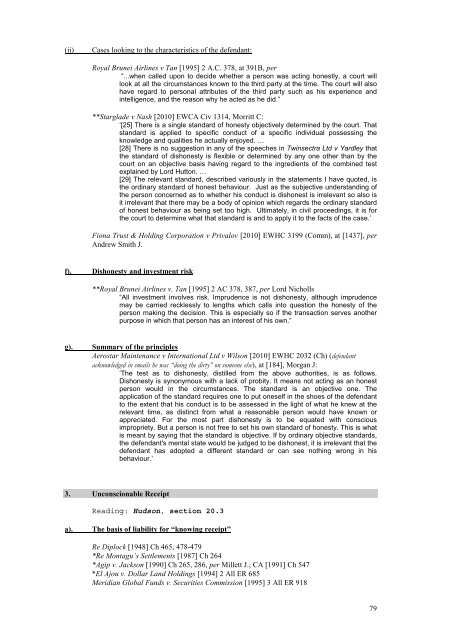Soton Equity and Trusts - alastairhudson.com
Soton Equity and Trusts - alastairhudson.com
Soton Equity and Trusts - alastairhudson.com
Create successful ePaper yourself
Turn your PDF publications into a flip-book with our unique Google optimized e-Paper software.
(ii)<br />
Cases looking to the characteristics of the defendant:<br />
Royal Brunei Airlines v Tan [1995] 2 A.C. 378, at 391B, per<br />
“...when called upon to decide whether a person was acting honestly, a court will<br />
look at all the circumstances known to the third party at the time. The court will also<br />
have regard to personal attributes of the third party such as his experience <strong>and</strong><br />
intelligence, <strong>and</strong> the reason why he acted as he did.”<br />
**Starglade v Nash [2010] EWCA Civ 1314, Morritt C:<br />
‘[25] There is a single st<strong>and</strong>ard of honesty objectively determined by the court. That<br />
st<strong>and</strong>ard is applied to specific conduct of a specific individual possessing the<br />
knowledge <strong>and</strong> qualities he actually enjoyed. …<br />
[28] There is no suggestion in any of the speeches in Twinsectra Ltd v Yardley that<br />
the st<strong>and</strong>ard of dishonesty is flexible or determined by any one other than by the<br />
court on an objective basis having regard to the ingredients of the <strong>com</strong>bined test<br />
explained by Lord Hutton. …<br />
[29] The relevant st<strong>and</strong>ard, described variously in the statements I have quoted, is<br />
the ordinary st<strong>and</strong>ard of honest behaviour. Just as the subjective underst<strong>and</strong>ing of<br />
the person concerned as to whether his conduct is dishonest is irrelevant so also is<br />
it irrelevant that there may be a body of opinion which regards the ordinary st<strong>and</strong>ard<br />
of honest behaviour as being set too high. Ultimately, in civil proceedings, it is for<br />
the court to determine what that st<strong>and</strong>ard is <strong>and</strong> to apply it to the facts of the case.’<br />
Fiona Trust & Holding Corporation v Privalov [2010] EWHC 3199 (Comm), at [1437], per<br />
Andrew Smith J.<br />
f).<br />
Dishonesty <strong>and</strong> investment risk<br />
**Royal Brunei Airlines v. Tan [1995] 2 AC 378, 387, per Lord Nicholls<br />
“All investment involves risk. Imprudence is not dishonesty, although imprudence<br />
may be carried recklessly to lengths which calls into question the honesty of the<br />
person making the decision. This is especially so if the transaction serves another<br />
purpose in which that person has an interest of his own.”<br />
g).<br />
Summary of the principles<br />
Aerostar Maintenance v International Ltd v Wilson [2010] EWHC 2032 (Ch) (defendant<br />
acknowledged in emails he was “doing the dirty” on someone else), at [184], Morgan J:<br />
‘The test as to dishonesty, distilled from the above authorities, is as follows.<br />
Dishonesty is synonymous with a lack of probity. It means not acting as an honest<br />
person would in the circumstances. The st<strong>and</strong>ard is an objective one. The<br />
application of the st<strong>and</strong>ard requires one to put oneself in the shoes of the defendant<br />
to the extent that his conduct is to be assessed in the light of what he knew at the<br />
relevant time, as distinct from what a reasonable person would have known or<br />
appreciated. For the most part dishonesty is to be equated with conscious<br />
impropriety. But a person is not free to set his own st<strong>and</strong>ard of honesty. This is what<br />
is meant by saying that the st<strong>and</strong>ard is objective. If by ordinary objective st<strong>and</strong>ards,<br />
the defendant's mental state would be judged to be dishonest, it is irrelevant that the<br />
defendant has adopted a different st<strong>and</strong>ard or can see nothing wrong in his<br />
behaviour.’<br />
3. Unconscionable Receipt<br />
Reading: Hudson, section 20.3<br />
a).<br />
The basis of liability for “knowing receipt”<br />
Re Diplock [1948] Ch 465, 478-479<br />
*Re Montagu’s Settlements [1987] Ch 264<br />
*Agip v. Jackson [1990] Ch 265, 286, per Millett J.; CA [1991] Ch 547<br />
*El Ajou v. Dollar L<strong>and</strong> Holdings [1994] 2 All ER 685<br />
Meridian Global Funds v. Securities Commission [1995] 3 All ER 918<br />
79













